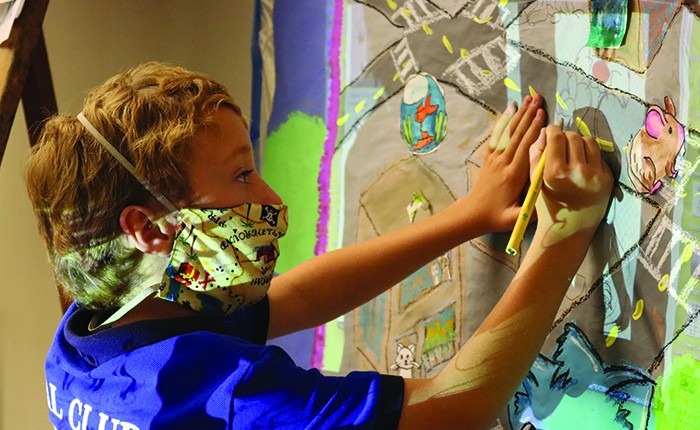Vital Arts Education Programs
During the Pandemic
. . .
Arts education is always important – life-giving and life-changing. But the need for students of all ages to experience and participate in the arts seems even more crucial in times of stress and tumult.
We’re grateful and inspired by the creative and determined educators in our museums and art centers, who shared these stories of changes, challenges and victories.
. . .
Dunedin Fine Art Center
The Healing Power of Art
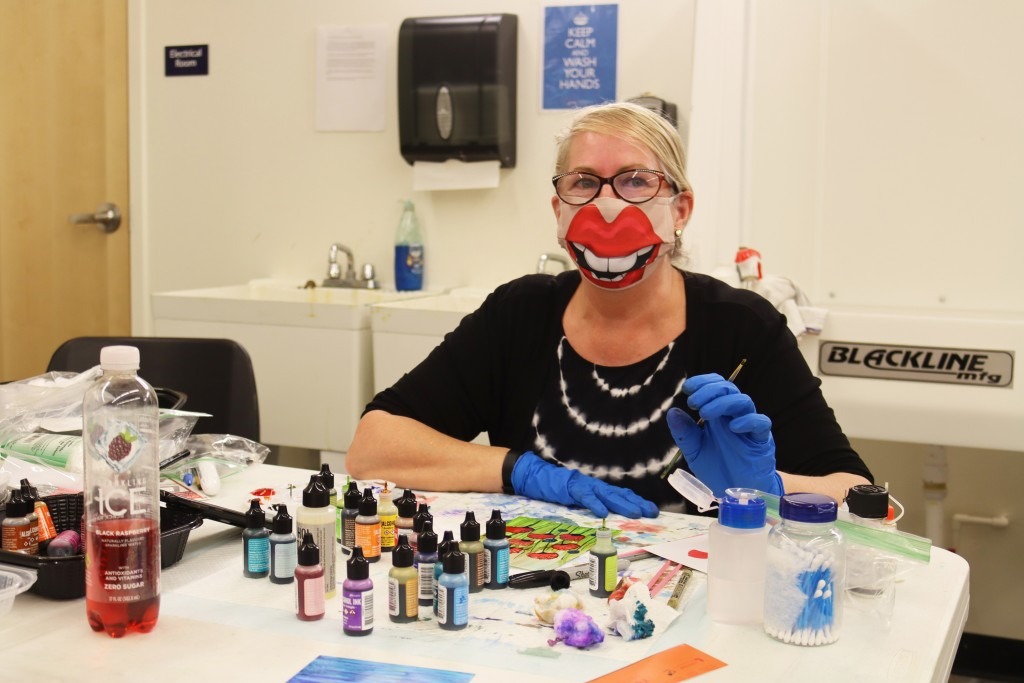
. . .
In March of 2020 Dunedin Fine Art Center (DFAC) closed its doors due to the COVID-19 pandemic, canceling 105 art classes for adults and children half-way through a six-week session.
For many of DFAC’s students, their weekly art class is a form of therapy, and it is the one activity that they arrange the rest of their week around. DFAC is a welcoming and inclusive space to express creativity, socialize with peers, and learn new artistic skills.
Suddenly, our artistic community was shut down. Our staff was diminished due to layoffs. Our faculty was out of work. Our art studios, all 20 of them, were dark and empty. We attempted some online programming, but our student population of mostly older adults did not want to participate in virtual classes. The future of the art center was very uncertain.
The staff at DFAC were determined to figure out a way to safely get students back into our studios to resume in-person art classes.
A plan was developed to ensure the health and safety of our students, faculty and staff as well as ensuring the cleanliness of our facility. Everyone entering the building would need to have their temperature taken. Masks were required. Class sizes were limited, and students were spread out at least six feet apart. Studios, tables, chairs and equipment were cleaned between each class. This became known as our Health & Safety Protocols. To our surprise, we are still following these protocols today.
. . .
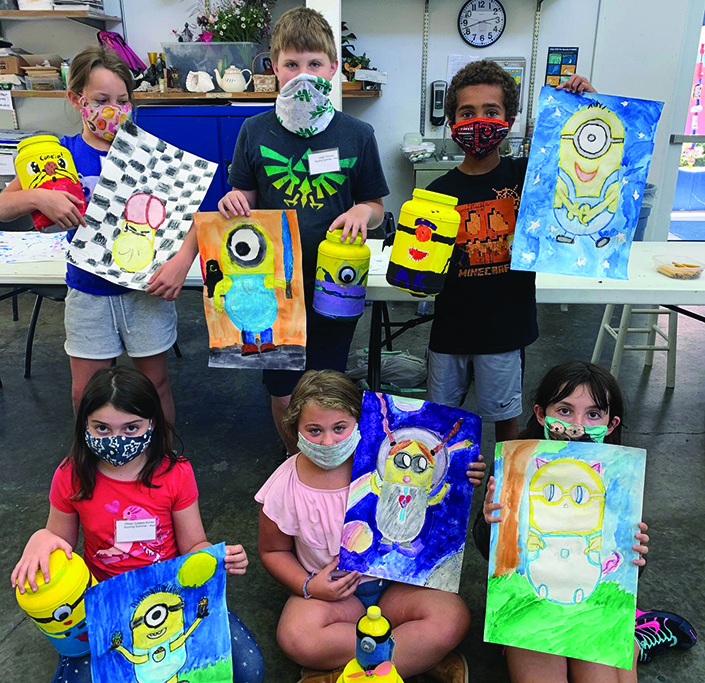
. . .
When DFAC reopened in June 2020 for Summer Art Academy and adult classes, the staff was delighted to see how many students were eager to get back to their art class, despite the ongoing pandemic. All at once paint was flowing, clay was being molded, portraits were being drawn and pastel paintings were being created.
A collective sigh of relief was heard and felt throughout the building. The students, many of whom are senior citizens, had spent the last two and a half months in isolation. Some had already lost a loved one to the pandemic. We could feel the sense of joy in returning to the creative community at DFAC that many local residents have been a part of for decades. Friendships were rekindled, and laughter and life returned to our artmaking spaces. Our instructors were able to return to our studios to do what they love – teaching art.
The DFAC Summer Art Academy hosts 7 camps for 10 weeks with an average attendance of 1,800 youth ages 4.5 – 14. With modifications to class size and studio layout as well as masks, drop off/pick up routes, deep cleanings, hand sanitizing stations and “health carts” in the studios, DFAC was able to provide enriching art experiences to over 900 youth in 2020.
By September of 2020, enrollment in our adult classes was steadily growing, even as the pandemic worsened. Now our woodturning lathes were turning, jewelry was being soldered, photos were being snapped and collages were being assembled.
We found that months of isolation had taken a mental and emotional toll on our students, and many were grateful to get back to their weekly art class to see their instructors and fellow students. DFAC’s classes not only provide quality art instruction, but also socialization and camaraderie for older adults who may be living alone. Our art center is a place for older adults to be seen, heard and acknowledged, when they so often feel forgotten in other parts of their lives. By returning to their weekly art classes, their sense of belonging had also returned.
. . .

. . .
During the Fall of 2020, DFAC saw an increase in new students signing up for classes. Many folks were out of work due to the pandemic and looking for a way to make the most out of their time off, as well as searching for a new community to become a part of.
In addition to registering for classes, new visitors were exploring our galleries and inquiring about volunteer opportunities. Several volunteers have joined the art center team since the pandemic began, and we would not have been able to operate without them.
Student enrollment continued to grow in 2021 with more students returning to their weekly classes. 2021 saw an increase to 941 youth in the Summer Arts Academy even though there were only 8 weeks available due to the Pinellas County Schools schedule.
DFAC continues to be proud to have provided safe, healthy and artful summer experiences as well as after school classes throughout the year. While we still have not returned to pre-pandemic numbers of students attending classes, we are grateful to the students who have returned and for the talented faculty who are committed to teaching at DFAC.
Many students have expressed their gratitude for DFAC’s Health & Safety Protocols that allowed classes to resume and students to feel safe in our building. And though they may not realize it, the activity of a weekly group art practice has a positive impact on their mental health, improves overall well-being and builds social cohesion.
. . .
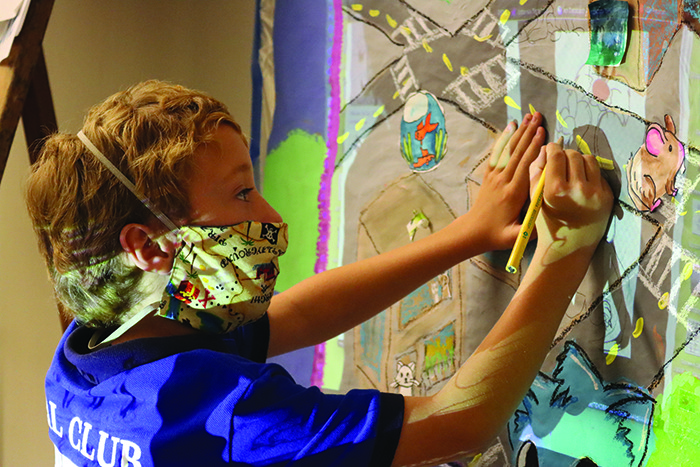
. . .
Our art classes have helped our students deal with the stress, anxiety and uncertainty during a pandemic, and given them hope that a return to normalcy is near.
. . .
Quotes from the 2020 Summer Art Academy. . .
“Our grands attended 2 weeks of camp. We very much appreciate all efforts made to sanitize and maintain a healthy environment. The Enjoyment the kids received from class & socialization Overrode the dread of wearing the masks. Kudos to u all.”
“I really appreciate all the measures you’re taking to keep everyone safe this summer. I wouldn’t have signed my kid up if you weren’t taking the precautions like masks, sanitizing and 6-foot distancing. I’m sure people are complaining but I am saying THANK YOU for making masks mandatory to keep both the kids and the instructors safe!!”
“We picked up our daughter’s clay creations today and she was so excited! You all do a wonderful job! It is the ONLY camp we felt safe enough attending this summer. We love DFAC!”
– Sara DeLorenzo, Adult Education Director
dfac.org
. . .
Leepa-Rattner Museum of Art
Tarpon Springs
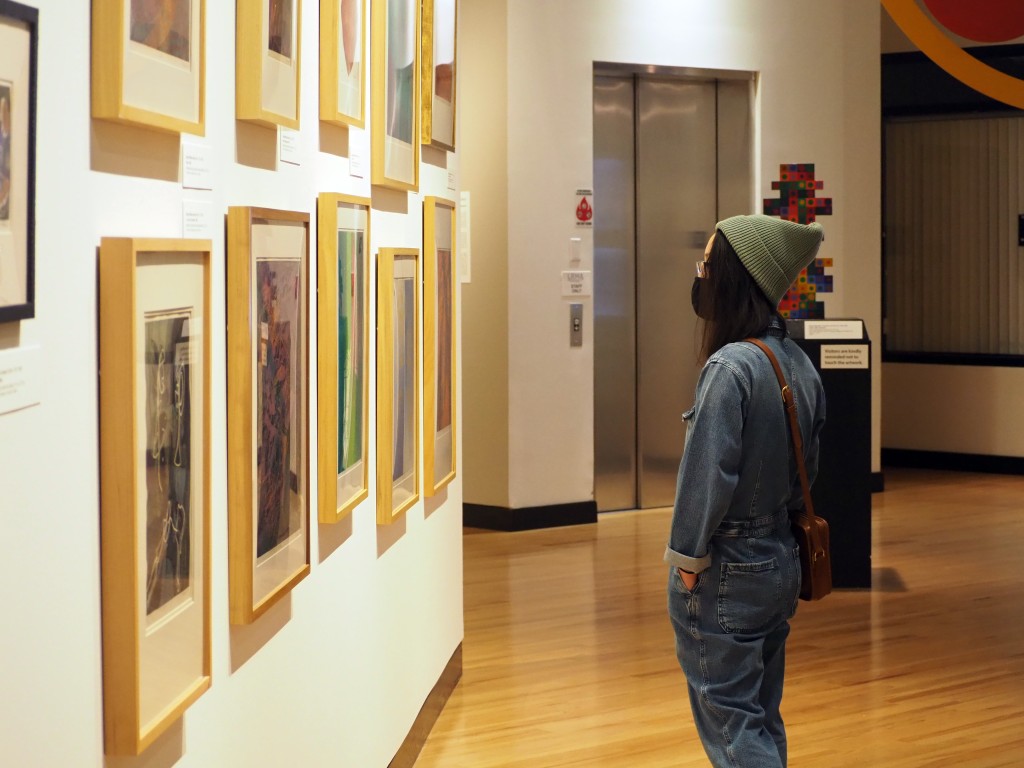
. . .
When the coronavirus pandemic sent everyone into lockdown in mid-March 2020, LRMA was one of the first museums in the area to quickly pivot to an online format, offering a variety of virtual exhibitions, virtual programs, classes, gallery talks and receptions through Zoom, and at-home activities that would continue to engage the community.
We found these programs were vital not only for the museum to stay engaged and relevant – but for the community it was a catalyst for self-discovery, an outlet for creativity and critical thought, or just a respite in these crazy times.
This has allowed the museum to broaden its audience on a national and international level, having 20,000 hits on our website within the few short months we were closed. Reaching beyond the boundaries of the museum walls through online programs and even into virtual reality, we have continued to use this model and now integrate technology into every exhibition we do.
. . .
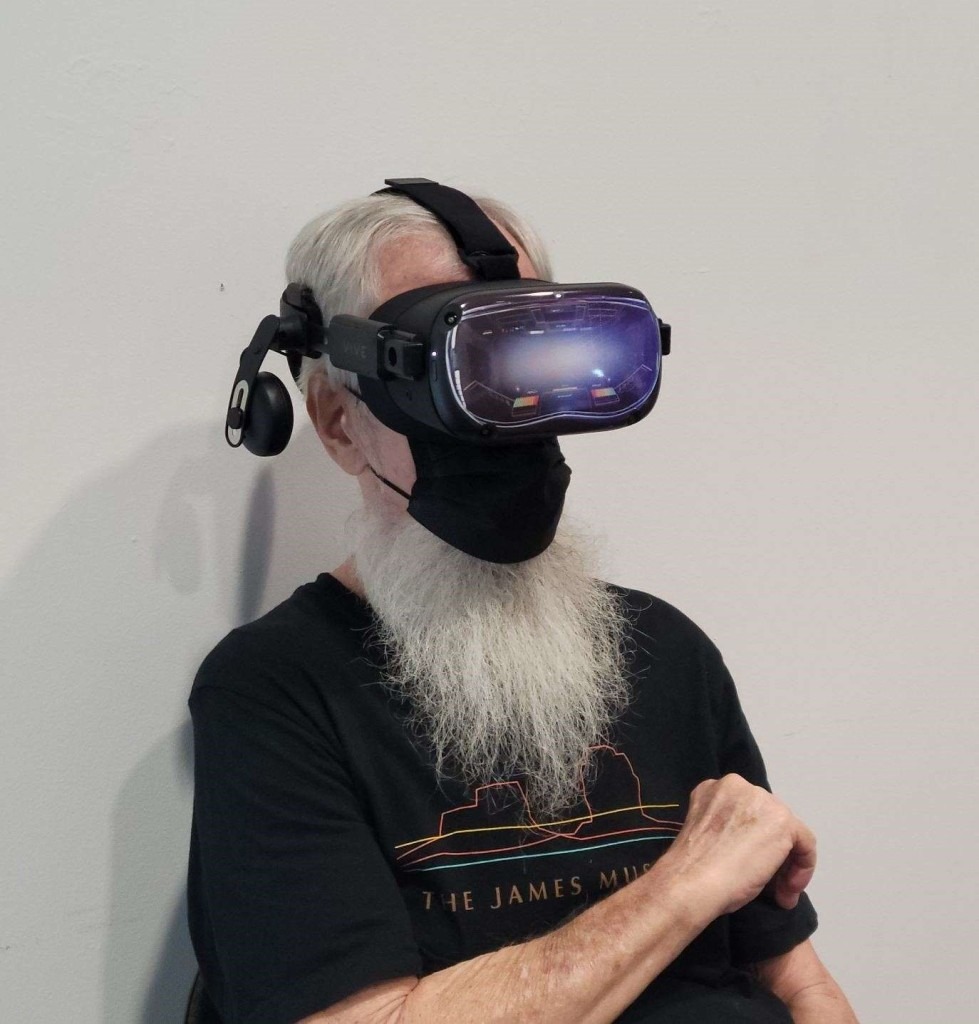
. . .
Last summer, just when everyone was getting “Zoomed out” we had our first in-person program in partnership with the Dunedin Fine Art Center, since we both had quilt exhibitions on view at the same time.
We hosted visiting Egyptian artists who demonstrated their quilt and appliqué techniques. This human interaction, especially with a tactile medium such as quilting, really brought everyone together.
Since then, we have been gradually re-introducing educational programs with in-person tours and special programs that are socially distanced, masks recommended, hand-sanitizer stations and limiting capacity to special programs through RSVP. With LRMA’s 20th Anniversary Masterworks exhibitions that just opened, we are gearing up for a busy season (and year) that will include a combination of in-person and virtual programs.
. . .
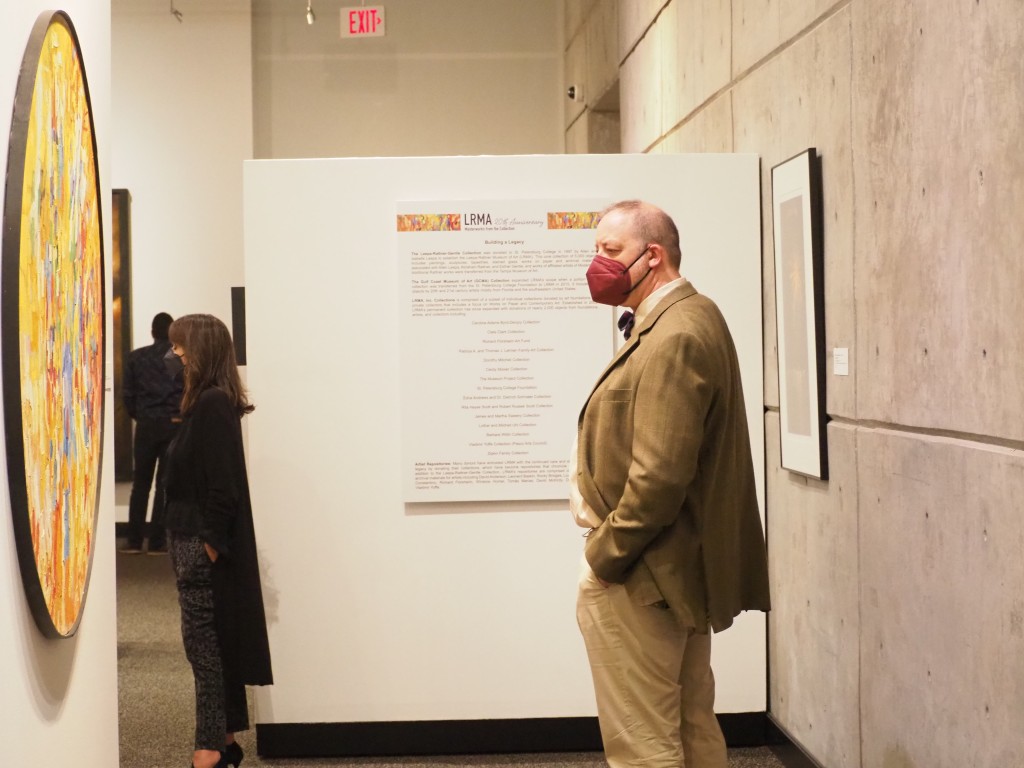
. . .
LRMA has a robust docent program, which was on a hiatus during COVID. In lieu of in-person tours, docents gave programs over Zoom and developed video tours sent to local schools.
We have just recently started going back to our regularly scheduled tours and programs. K-12 schools are starting to book tours, which will be broken into smaller groups as we take them through the museum for social distancing. At the beginning of COVID, our children’s education space (the Challenge of Modern Art Interactive Gallery) was dismantled due to some construction and minimizing high-touch surfaces.
Over last summer, LRMA also made the transition of being a stand-alone museum, dissolving its 501c3 to become a full department of St. Petersburg College which ensures the museum’s sustainability and ability to better serve the community. Thanks to SPC, the museum is even more accessible – with free membership and museum admission by donation.
Our biggest challenge is that our staff is very small, but the work we do is mighty. Since we are currently without an education coordinator, we are creative with our programs and rely on our dedicated docents and volunteers now more than ever before. We plan to work closely with SPC’s faculty, staff and students on integrating LRMA into the curriculum and other cross-departmental collaboration.
. .
Victory
We converted our education area into a temporary exhibition space, which became a GREAT space for the Louis Markoya: A Deeper Understanding exhibition (on display through February 6). This exhibition became one of our most popular exhibitions ever.
. . .
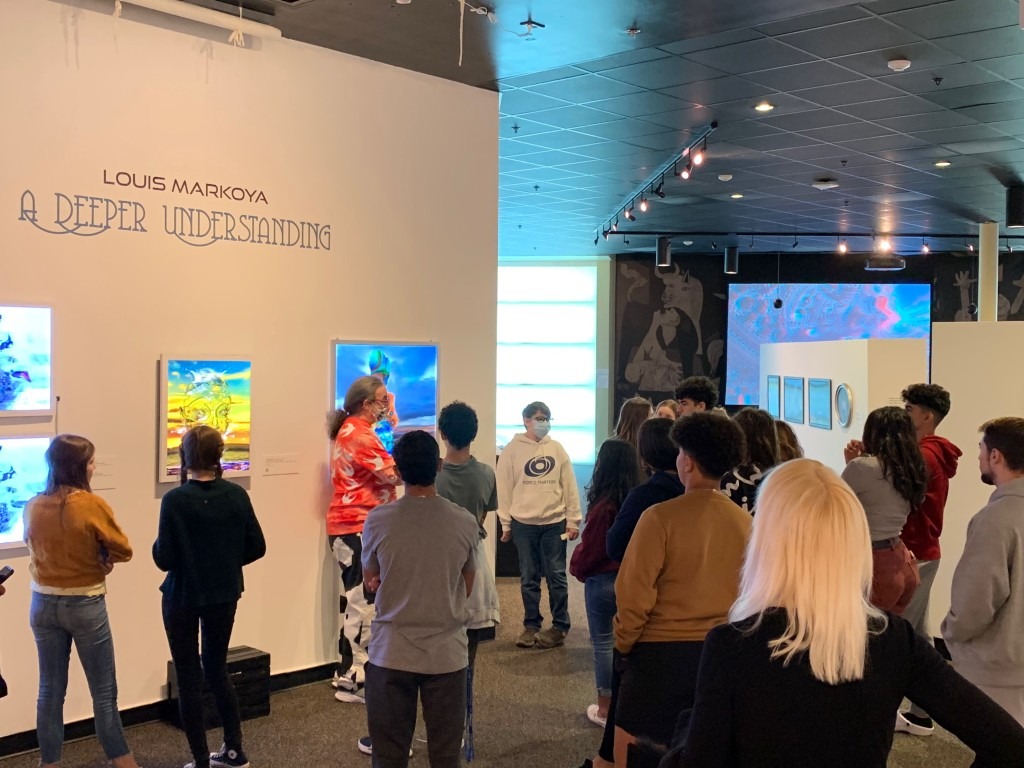
. . .
I consider this a major victory for us on all levels, as we were undergoing a transition with College and with staff. Markoya’s exhibition opened us up to a new world that merges art and technology, making the art and “the museum experience” more accessible through immersive experiences and 3D technology. It appealed to a broad audience, young and old alike.
The educational aspect included math, science and technology, art and philosophy and we were so thankful that the artist made himself available for numerous programs and tours. Visitors relished the chance to meet the artist, a former protégé of Salvador Dalí.
Having access to SPC’s faculty and staff, we partnered with SPC’s Innovation Lab to create Markoya’s 3D film and exhibition in virtual reality and we have been working on building virtual museum tour of the permanent collection.
Markoya’s newest series The Virus Arc was a response to COVID and it has been quite healing for many visitors. This exhibition has seen us through a challenging time and offered meaningful experiences to so many.
As in-person programs and school tours are starting back up and Markoya’s exhibition comes to a close, we are working to reimagine this versatile space with interactive technology.
. . .
Upcoming Online and In-Person Events
at the Leepa-Rattner
For LRMA’s 20th Anniversary exhibition we are offering a combination of virtual and in-person programs. All in-person programs recommend masks and social distancing.
We also have docent led tours every Sunday at 2 pm and our monthly Focus Friday program, which features a work from the collection presented by a docent. You can check our website at leeparattner.org/calendar for upcoming programs.
. . .
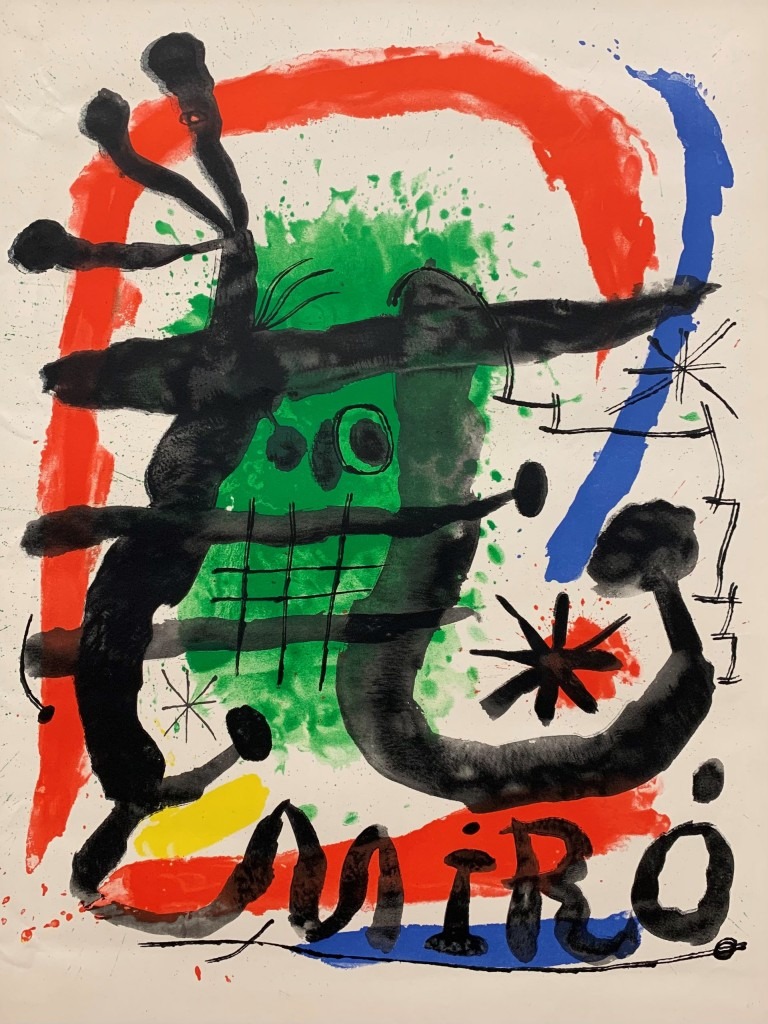
. . .
Virtual Gallery Talk with the Curator
LRMA 20th Anniversary Masterworks and Francais Impressions
Sunday, February 20
3–4 pm
Join via Zoom
Join LRMA’s curator Christine Renc-Carter as she explores LRMA’s 20th Anniversary Masterworks from the Collection. Highlighting the evolution of Modern Art through the eyes of Abraham Rattner and renowned local artists, we explore 200 years of art, from Goya to Renoir to Chihuly.
. . .
Gallery Talk
Atelier 17 and its Founder Stanley William Hayter
with scholar Ann Shafer
Thursday, February 24
5:30-6:30 pm
In-person program
SPC Tarpon Springs Camus, Leepa-Rattner Museum of Art, Interactive Gallery
Free, donations welcome
Art historian Ann Shafer explores the origins of influential artist and educator Stanley William Hayter and his printmaking workshop Atelier 17.
. . .
Virtual Talk
The Women of Atelier 17 with scholar Christina Weyl
Thursday, March 24, 2022
5:30-6:30 pm
Zoom Program
In honor of Women’s History Month, art historian and author Christina Weyl brings to life the stories of women printmakers from the Atelier 17 workshop and the advent of modernism and feminism.
. . .
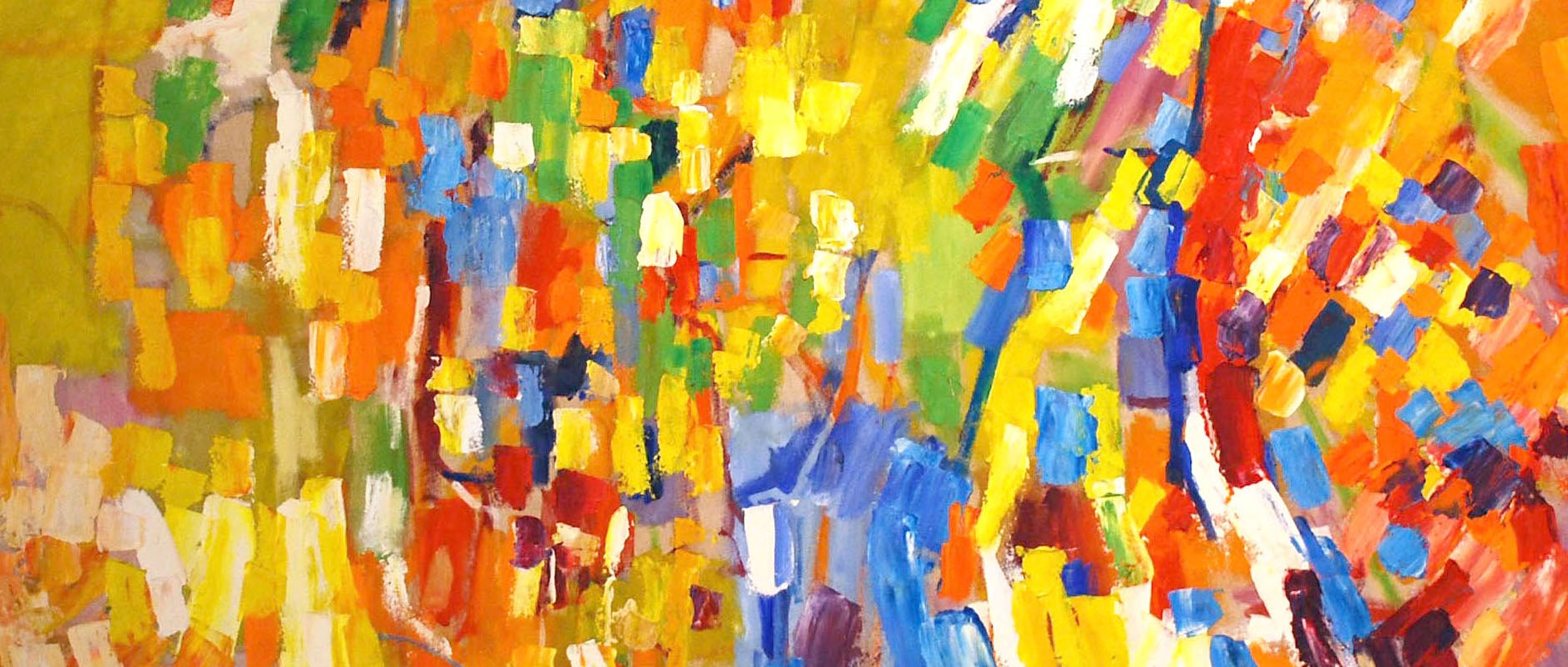
. . .
Demo/Workshop
Viscosity Printing with Tyrus Clutter
Friday, April 8
SPC Clearwater Campus, Crossroads Building
10 am – 12 pm
Free, donations welcome
Explore the vibrant world of color viscosity printmaking with visiting collector, professor and artist Tyrus Clutter, Associate Professor, College of Central Florida. Participants will have the opportunity to make their own plate and print in multiple colors in one pass using this technique developed by Stanley William Hayter at Atelier 17 in the 1950s. Materials provided. Capacity is limited. Sign up will be posted at leeparattner.org/calendar.
. . .
Gallery Talk
Collecting Prints with Tyrus Clutter
Friday, April 8
5:30-6:30 pm
SPC Tarpon Springs Camus, LRMA, Interactive Gallery
Admission is free, donations welcome
Collector, professor and artist Tyrus Clutter shares his unusual and exciting journey as a collector of prints by renowned printmaker Stanley William Hayter and the international artists of Atelier 17.
. . .
On-Demand Videos
The Leepa-Rattner’s You Tube channel features many virtual programs and Louis Markoya’s artist talk. You can visit Leepa Rattner – YouTube to explore.
. . .
– Christine Renc-Carter, Curator
leeparattner.org
. . .
Stageworks Theatre
Tampa
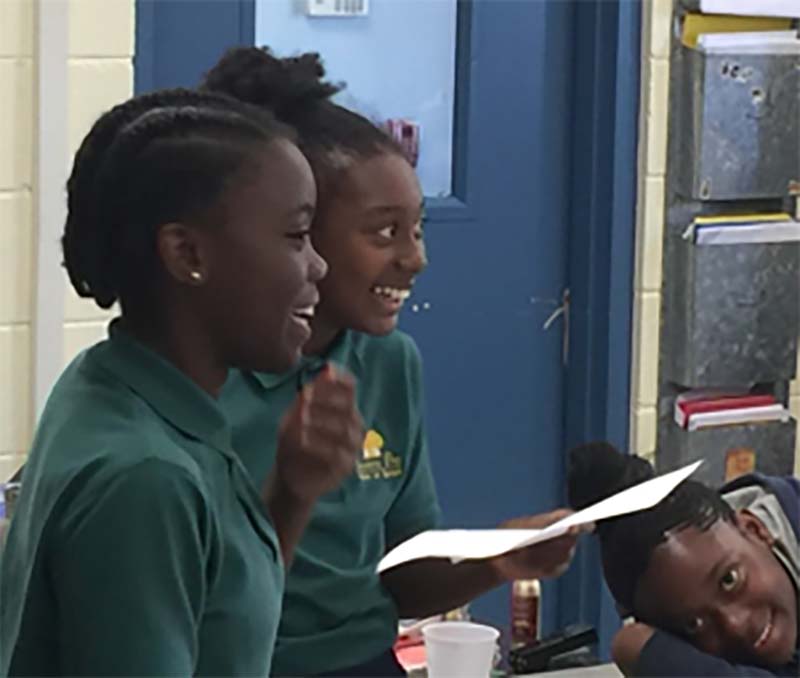
. . .
Stageworks Outreach offers drama, drumming and team building programs for at risk youth.
During the shutdown, we offered online monologue classes and I was astonished by the student’s response. I came to realize that the performing arts are much more than self-expression. They are a vehicle for connection – with other youth and with the instructor. That, above all, was what they were craving.
The need to socialize, especially with young adolescents, is so intense. Being cut off from your peers because you cannot socialize as you used to, is a loss that is deeply felt. The students’ almost desperate need to be seen and heard and connect with each other and with me was palpable.
My 45-minute class often stretched to 2 or 2 ½ hours because students just didn’t want to the class to end. They would hang out waiting and waiting for their turn. Sometimes they would tell me they had to leave but would beg me to wait for them to come back. And they would. Sometimes Zooming in from the car as they were being driven home.
We were able to continue drumming classes even during the shutdown simply because drumming is a lot more resilient to Covid protocols, such as masking and social distancing, than other performing arts. Not that it was easy.
. . .
. . .
Many of the sites our drum instructor Alvon Griffin visits are juvenile detention facilities. Here, where the kids are in lockdown all the time with limited opportunities to express themselves, the drum becomes their voice.
These days, it is also a way to ease the stress for both staff and youth. The staff use it as an opportunity to lessen the tension by participating in the drumming, by showing off their dance moves or even rapping. The whole mood of the room shifts, and everyone is sharing the rhythm and enjoying each other.
The main takeaway for me, now that we are in-person again, is the need to really focus in on the kids and take my cues from them. Just following the old lesson plan won’t work. Their needs are different and become obvious if you are paying attention.
. . .
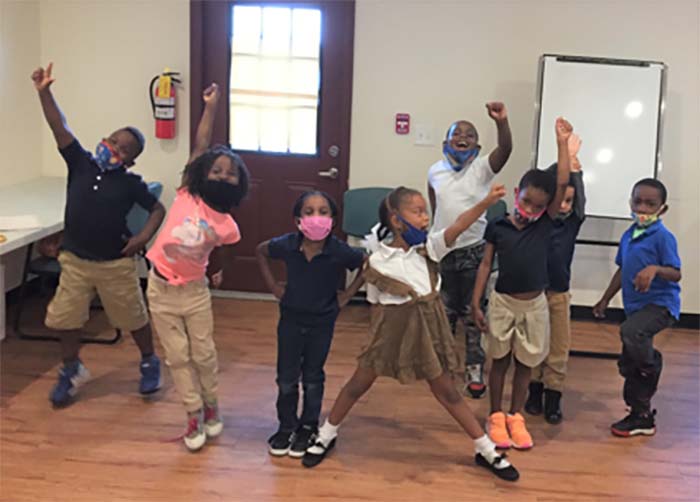
. . .
Specifically, the pandemic has clearly warped the students’ social interactions. The disruption of their education, being bounced from remote learning to in-school learning and back again, has chipped away at their ability to cooperate or even to just get along.
This became abundantly clear during a team building workshop with middle schoolers. Activities that are usually sure winners with the kids have broken down into arguments, even shouting matches. After a while, I realized what the kids needed most was 1) structure and 2) fellowship.
After a very energetic activity with a group of 6th grade girls, I asked the class to lie down, to get them to calm down. (Structure)
. . .
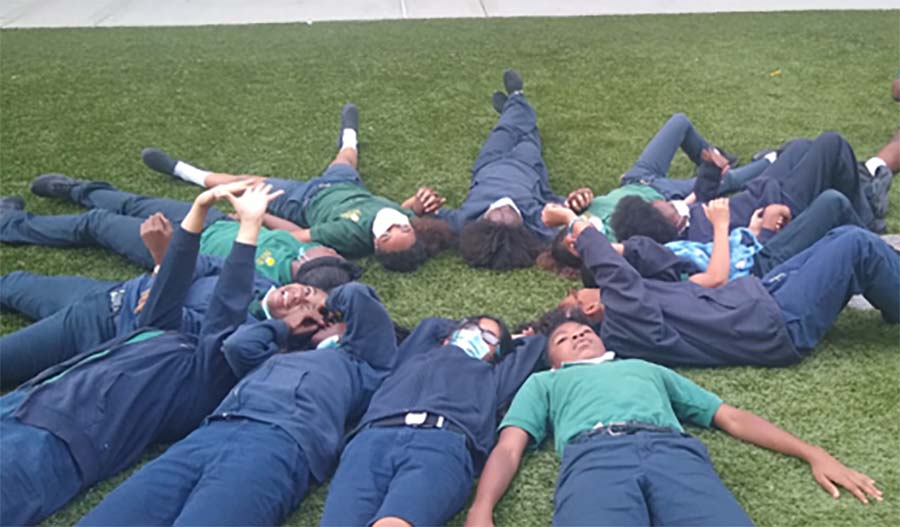
. . .
A few girls, on their own, formed a kind of star with their heads together, holding hands. Sensing an opportunity, I challenged them to see if we could fit the whole class in the circle and they did.
Then I threw out a song challenge word (sing a song that uses that word) and they all began singing together – loudly. (Fellowship)
Then it just kind of took off. They sang song after song and laughed, and it was beautiful.
– Dawn Truax, Director of Education Outreach
stageworkstheatre.org
. . .
The Dalí Museum
St. Petersburg
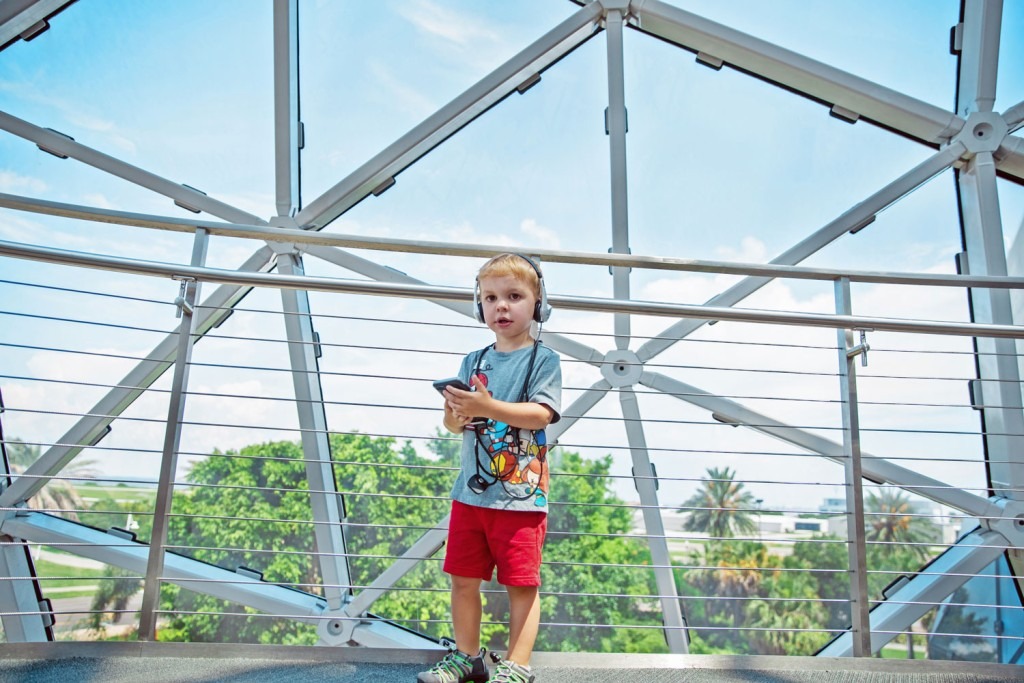
. . .
Here are a few ideas and three great programs that reflect how the Dalí pivoted education during the pandemic.
Challenge – field trips and group tours too large for social distancing.
Solution – smaller groups less frequently, but still free.
Challenge – large in-person gatherings impossible with social distancing.
Solution – offering virtual and in-person options so people can attend what they are comfortable with (i.e. Dilly Dally virtual weekly art activities and Junior Docents going virtual last summer)
Challenge – Fashion Design at The Dalí students can’t gather in a single classroom.
Solution – instead of large in-person gathering, creating a runway video version which has much broader reach.
. . .
Thrilling Moments
Strongest Statewide Student Surrealist Art Exhibit entries ever.
Van Gogh Alive “Paint Your Bedroom” contest – kids category was very strong.
Junior Docents thrived in a distance learning environment despite all the challenges.
. . .
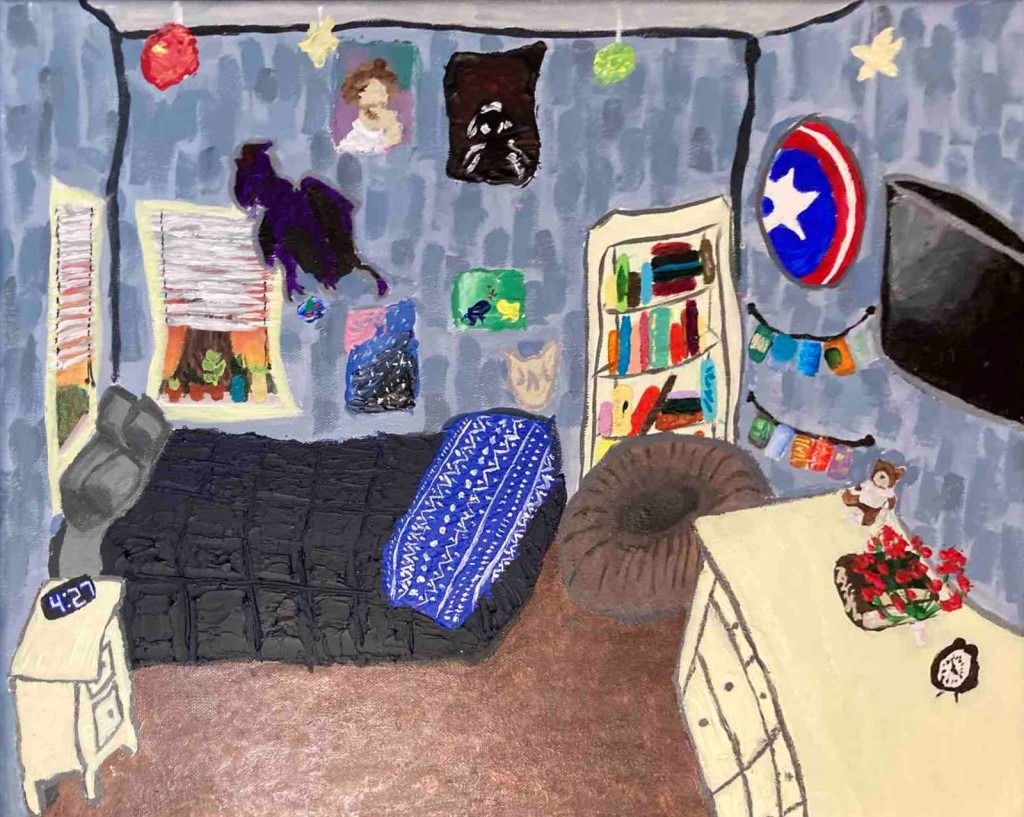
Fashion Design at The Dalí
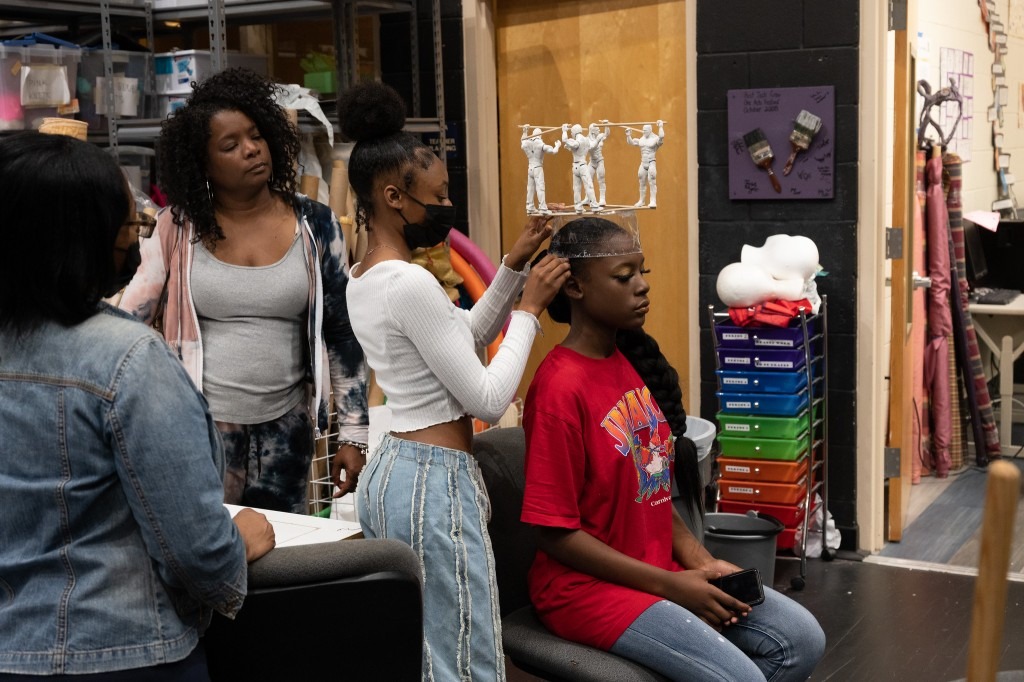
. . .
This teen program just celebrated its fifth year at the museum. This free program allows high school students to learn the fundamentals of design, construction and runway presentation from experienced artists and designers.
Using non-traditional materials, students are invited to think creatively to produce wearable works of art that translate from sketch to runway. Designs are showcased at a runway event at Pinellas County Center for the Arts at Gibbs High School and through a fashion film project shot at The Dalí Museum. Selected designs win prizes in six categories and are honored in a display at Neiman Marcus located in Tampa’s International Plaza.
Last year the students met virtually, and it was not possible to have the runway show. This year we returned to an in-person program, with 27 students. They had a Gibbs runway show, and a video of their creations will be shown as part of an exhibit at Neiman Marcus.
You can see photos from the Gibbs runway show here.
thedali.org/programs/fashion-design-at-the-dali
Student Surrealist Art Exhibition
. . .
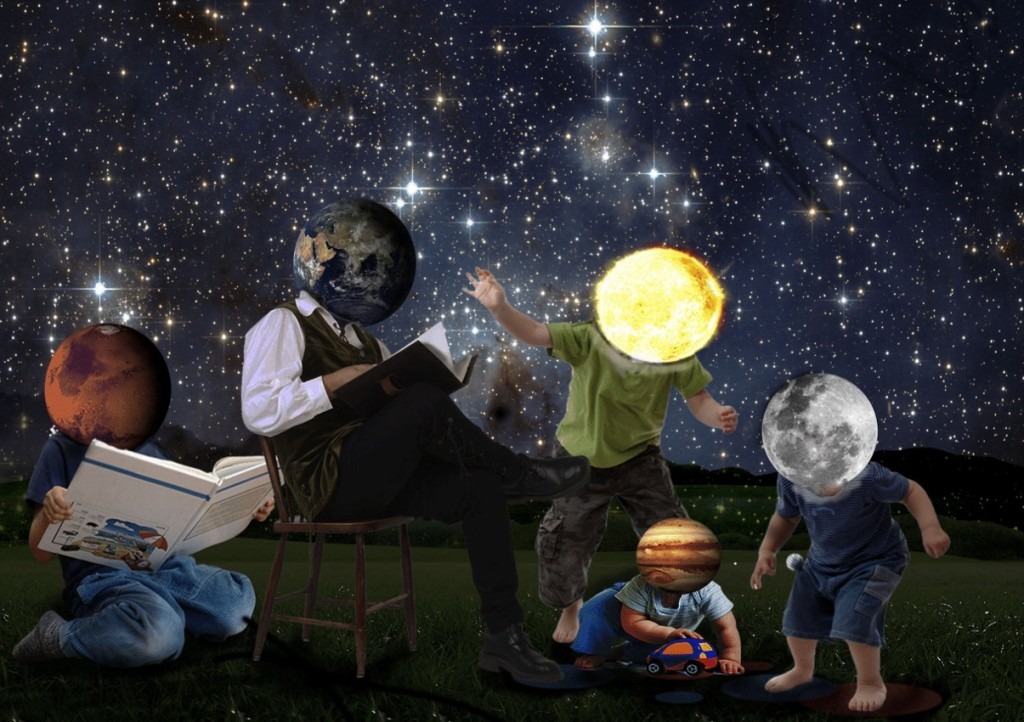
. . .
Initiated in 1985, this annual juried art exhibit presents work by middle and high school students invited to explore ideas and visions similar to those explored by Salvador Dalí and the surrealists. Over the course of each year, The Dalí Museum features three separate student exhibits — for Pinellas County, Hillsborough County and a Statewide Florida exhibit.
When the pandemic started and we closed for 3 months, we were unable to show the Hillsborough exhibit that we were about to install. So we decided to create an online gallery of the work.
It took many many hours to create, but I think it was one of the best things we produced. We liked it so much that we decided to make an online gallery for every one of these student exhibits. Since we were unable to gather in person, we did our reception virtually.
Now that we are starting to gather again, we plan to have our first in-person student gathering in February. It will be an open house instead of a program so that we maintain social distancing, but we are thrilled that we will have students seeing their show together again.
Here are the online galleries for our last two exhibits
thedali.org/exhibit/ssae-online-exhibit-pinellas-county-2022
thedali.org/exhibit/student-surrealist-art-exhibit-online-statewide-2021
. .
Two Teacher testimonials –
“I’m so excited to share the opportunity and the incredible news about our two Award Winning Dr. Phillips HS Art Students and their incredible works of art!!! Congratulations Skyla for receiving the Award of Excellence and Anika for receiving the Award of Merit!!!
“WOW!!!!”
“I’d like to thank you for providing such a wonderful state level exhibition for our students to create work for each year! They enjoy the challenge brought forth from the exhibition’s written explanation of the theme which always provokes synthesis and thoughtful ideation of art making in the student’s creative process.”
. . .
Dalí Art Mobile
. .
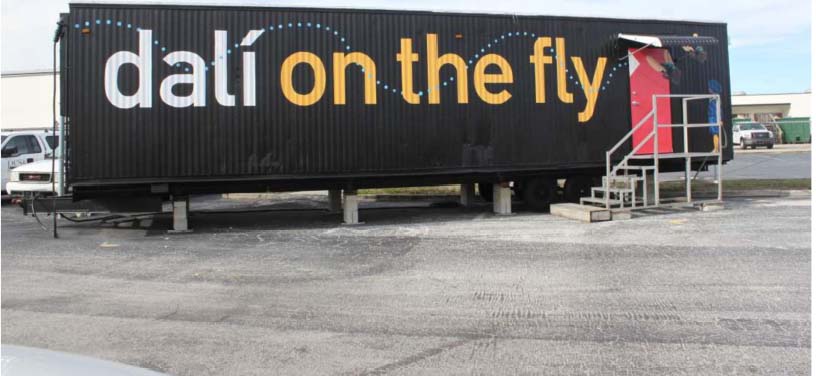
. . .
The Dali Art Mobile is a themed, mobile classroom traveling trailer which draws connections between the artist Salvador Dalí and the worlds of math, science and dreams, from which he drew inspiration for his art. It is a joint partnership between the Dalí Museum and Pinellas County Schools.
During its 4-year program, the Art Mobile will be seen by 40,000 Pinellas County K-5 public students.
Last year the Art Mobile was suspended because of covid, so we created a Dalí Activity Booklet that can be shared by teachers with their students in lieu of having the mobile. You can download the PDF here.
– Peter Tush, Senior Curator, Education
. . .
Online and In-Person Programs
for Students of All Ages at the Dalí
. . .
Coffee with a Curator
. . .
A compelling series of focused illustrated talks on a variety of Dalí-related topics and themes. You can find an array of filmed talks here.
When new talks are scheduled, they’ll be on this page.
. .
DillyDally with Dalí
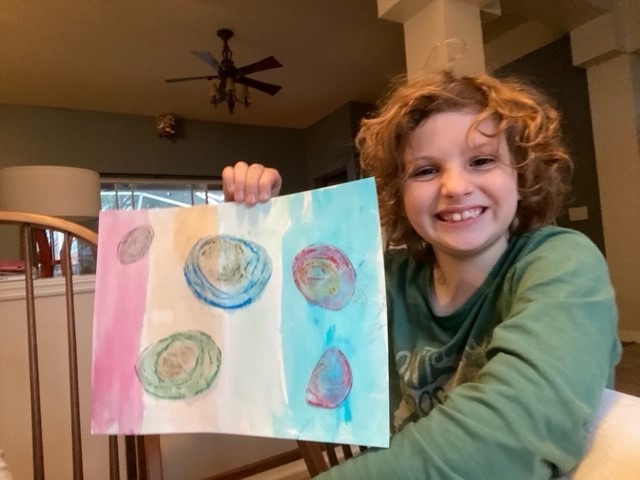
. . .
Children 6-11 can discover the creative world of Salvador Dalí through arts and crafts activities inspired by the Museum’s permanent collection and special exhibits.
Each week features a new activity – materials are generally flexible and include standard household items.
This program meets virtually via Zoom on select Thursdays, from 5-5:30 pm. Registrants receive information each week, including Zoom secure login information, lesson plans and material requirements.
thedali.org/events/category/family
. . .
Docent Dialogues: A Dalí Deep Dive, Provoca Talks and Lectures
You can find a schedule of in-depth, in-person explorations of Dalí topics here.
. . .
Film Club at The Dalí
Using current exhibitions as a theme, the Dalí chooses a movie that’s available at a low cost or free on one or more digital streaming platforms. We provide you with some questions to get you thinking as you watch the film. We all watch the film on our own – and then we meet virtually for a Zoom conversation facilitated by a Dalí Museum staff member. Free, once a month via Zoom.
thedali.org/events/category/films
. . .
Follow the Tangent: Art, Archives and Anecdotes
A bimonthly video podcast delving into the world of art archives and the often-unexpected gems that are uncovered in the course of researching Dalí, Surrealism and the myriad visiting exhibitions hosted at the Museum. Available on YouTube.
. . .
Junior Docent Art Camp
. . .
Open to Elementary and Middle School students ages 9-14. Campers learn the fundamentals of interpreting a painting and how to share a compelling story as they gain a deeper understanding of the power of images. Students learn about Salvador Dalí and surrealist art, and are empowered to think independently about art and express their own thoughts.
Two weeks virtually and two weeks in-person.
. . .
Poetry at The Dalí
A diverse array of poets share their work, hosted by St. Petersburg Poet Laureate, Helen Wallace.
Available online here.
You can find upcoming readings on this page.
. . .
Teen Voices
This free semester-long program empowers students in grades 9-12 to become interpreters of the world and works of Salvador Dalí, through writing and voicing an audio tour by teens and for teens.
Meeting are held online, with one in-person recording session.
You can hear recordings at thedali.org/programs/teen-voices
Virtual Exhibits, Activities and Resources for Kids and Adults
You can find online exhibits, virtual reality, activities, videos, lesson plans for kids, creativity prompts and brain games for grownups,
. . .
– Joy Garrett-Douglas, Education and Community Programming Associate
thedali.org
. . .
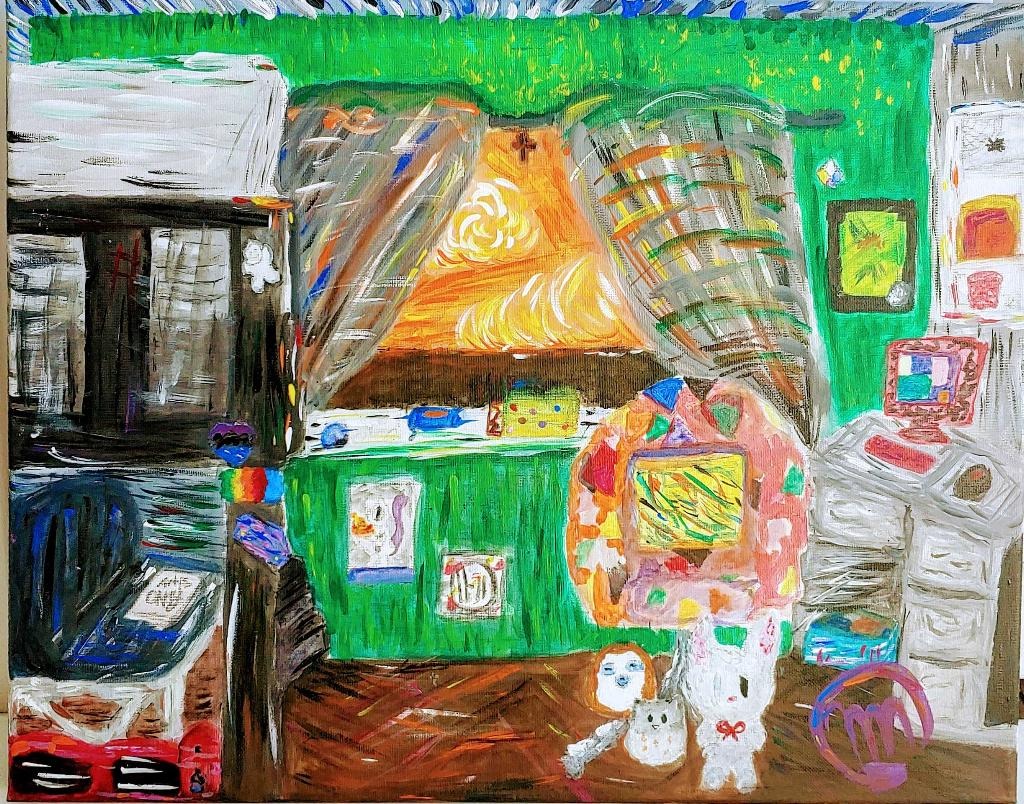
. . .
